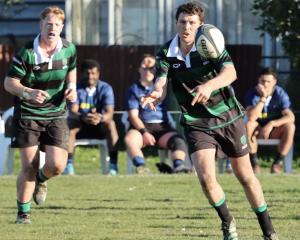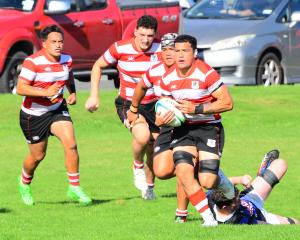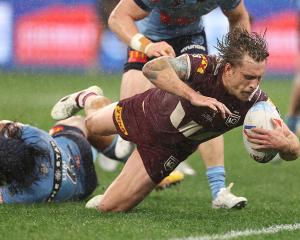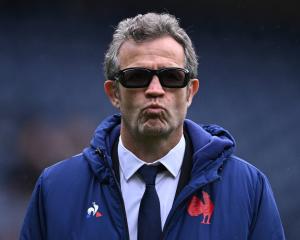
The dark days
Part of the routine at many Dunedin workplaces is gathering for morning tea, browsing through the Otago Daily Times and having a natter about the issues of the day.
Richard Kinley remembers the scene well.
In early 2012, he was working as a programme director at Sport Otago. And, like all of his colleagues, he was alarmed at what he was reading — every day, it seemed — about the state of the region’s biggest sporting organisation.
Otago rugby was at death’s door, drowning in millions of dollars of debt and about to announce 131 years of history was to end in liquidation.
"It was really concerning and actually quite worrying," Kinley recalled.
"This sport, with such a long and proud history in Otago, was going through such a challenging period. Everyone I knew at that time had a connection to Otago rugby, whether they’d played it or were a fan, and everyone was in a bit of shock."
It would not be long before he had a front-row seat to the drama.
While the union struck deals with banks, councils and creditors to pull back from the brink, Kinley was being lined up to lead a somewhat chastened Otago Rugby Football Union into a future that hardly looked bright but was at least secure.
He was seconded to the role of interim general manager in May, and assumed the role on a permanent basis on August 13.
"Liquidation was still a possibility but a new board, working with New Zealand Rugby, needed someone to come in to oversee the rugby programmes that were happening, because there were still staff employed and community rugby in place.
"The ORFU board spoke to Sport Otago and suggested I be seconded short-term, until the union knew what the future was going to look like.
"Part of my job was to start the process to recruit the new GM. I eventually indicated my interest in applying for the role, so I withdrew myself from running the process."
Some might have seen it as a poisoned chalice.
Otago rugby’s image had taken a battering, there was not going to be much money around for a while, and (presumably) there were employees and creditors and supporters in various states of shock and anger at what had transpired. But Kinley wanted to stay.
"The staff culture and morale, considering everything that had happened, was quite exceptional.
"The team here had been through absolute hell — they didn’t know, from week to week, if they had a job — and they were just so committed to doing what they could to support the game throughout Otago.
"It was pretty inspiring, to be fair. They were so connected and motivated."
Much-respected community rugby identity Richard Perkins is the only permanent staff member left from the autumn of discontent.
Kinley caught up with a couple of former staff members recently and said their passion for rugby, something that kept the staff going in 2012, was still evident.
He had two other reasons for wanting to stay to lead the recovery.
"Working with the new board, particularly Doug Harvie, the chair. He and I developed, even in a short time, a really good working relationship, and I felt that was something I wanted to continue to develop.
"And I saw a really good challenge, and an opportunity for me to be part of the future of the game while developing my own skills and experience."
The rebuild
Otago rugby had stood for innovation, enterprise and success.
But halfway through 2012, the glory years were long gone. A very public financial meltdown had been followed by some heated debate, the odd legal stoush and the oddly entertaining but slightly embarrassing sight of a national TV show holding a sausage sizzle to raise money for a major sports organisation.
There was no doubt Otago rugby had some work to do, Kinley said.
"It was really important for us that we reconnect with all our stakeholders. Sponsors and commercial partners had stayed loyal but were feeling pretty let down, so it was important to build those relationships.
"Then there were the clubs and schools. We needed to get out here and say, hey, we’re here, we’re growing the game, we’re here to support you."
There were not a lot of resources, so the ORFU had to get creative. It was a strong adopter of social media, and relentless in pushing the message that while times had been tough, Otago rugby was still alive.
The ORFU had been saved from liquidation and had no intention of flirting with financial disaster again.
"We were certainly very financial-focused for a start," Kinley said.
"We spend every dollar here like it’s our own, and I make no excuses about that. Are we being too frugal sometimes? We possibly are, but that’s the nature of our organisation, and I think that’s the nature of the sporting sector in Otago, full stop.
"We’ve got to be really careful with our resources and our investment, and making sure we’re balancing that with meeting as many of the needs as we can in the community."
Otago no longer had the burden of owning its own ground, Carisbrook. The flip side of that was it had to take whatever space it was given at the new stadium.
"We didn’t have a proper office. We were just crammed in one room down at the end of level 2 with one window that opened.
"Slowly we developed an office area. It doesn’t have all the bells and whistles, but it’s fit for purpose, and we can now hold meetings and seminars and board meetings.
"And our little gym facility has made a massive difference. There are probably 200 players a week coming in to use it."
The shield
Strangely, 2012 and 2013 were excellent seasons for Otago on the field.
The union’s men made the NPC Championship final in 2012. Captain Glenn Dickson, a proud third-generation Otago rugby player, wrote an open letter to the public in the ODT thanking them for their support during the financial crisis.
And, a year later, the Holy Grail. After 56 painful years, Otago finally got its hands back on the Ranfurly Shield with a dramatic 26-19 win over Waikato.
The shield stayed for only nine days — Otago lost it to Hawke’s Bay — but it was a magical time.
"Those nine days are something I will never, ever forget," Kinley said.
"It was absolutely crazy. It probably just reconnected us with the community and our commercial partners.
"Taking the shield out to the country areas — I think everybody got their photo taken with it — was just a really good way to reconnect with the community.
"It wasn’t just a high-performance thing. It was more an emotional thing. Just a pretty special time.
"In terms of finances, we had 18,000 people for the game against Hawke’s Bay, which is unheard of these days. That was the icing on the cake. Some players still talk about it being the most amazing atmosphere they’ve ever experienced."
Otago then got greedy, winning the Log o’Wood again in 2018 — defending it six times before letting it go again — and again in 2020, for a seven-day spell.
"If someone had said when I started, you’re going to win the Ranfurly Shield three times in nine seasons, I would have laughed. You would take that and run.
"Having the shield over the summer in 2018-19 was really special. It was great to actually spend more time getting it out to more people and really connecting with them."
The numbers
Otago rugby had 7272 players in 2012, the year the union nearly went broke.
Last year, that number had risen to 8311.
"I’d say that’s steady growth, not huge growth," Kinley said.
"But I look at the evolution of rippa rugby, and more girls playing the game, and growth in Central Otago. Those are good signs.
"Since about 2017, we’ve seen another 300 male players aged 19-plus join the game. We’ve been working with metro stakeholders around changing eligibility in the colts competition, so anyone who wants to play the game can play, and that’s made a massive difference.
"It’s about understanding what our participants are looking for, and shaping opportunities and competitions to meet that is an ongoing focus.
"You’ve got your traditional player base. The question is how you keep the sport relevant to the new generations coming through.
"There are still people of all ages connecting to the game, but the way they connect is different. So how do you provide that traditional product, for the players who want that, but also have other ways of getting people involved with the game?"
Rightly or wrongly, people view Otago rugby mainly through how its flagship teams, the men’s NPC team and the women’s Otago Spirit, perform on the field.
For Kinley, the ORFU must not lose sight of the fact it is here to serve 8000 players, 600 coaches, 100 referees and the many volunteers and administrators who keep the game going.
"We’re not at the top of the pyramid. We’re there to support the community game, because that’s our lifeblood.
"We can talk about the Spirit and the NPC team and other rep teams, but that’s just an outcome of the grassroots programmes and pathways.
"If you lose sight of what your core business is, you lose connection with your community, and we’ve worked hard to make sure we support those grassroots."
From a high of nearly 40 staff when it operated the Highlanders franchise, the ORFU dropped to just nine employees in 2012.
That number will be up to 13 when a couple of new roles are filled soon. Otago maintains a fulltime referee development role, unlike some other unions, and is also looking at employing someone in a new game development manager role.
"We’ve got to be really careful with what we do. We’re pretty conservative, and we need to really plan and co-ordinate the resources we allocate.
"It’s not a large staff but I think we’ve managed better than some unions with bigger staff numbers who rely on things like gaming funding."
Otago is one of the biggest unions, geographically, which creates some challenges.
Kinley said NZR funding was now built around province-specific outcomes. That could mean, for example, putting money into a coaching resource based in Central Otago, a smarter option than having Dunedin-based people travel there and back for a two-hour session.
The union is also looking at creating roles for four part-time "activators" to drive women’s rugby around the region.
"You always need to think about how you can do things differently. It’s still much the same business, but how do you do it better?"
In its last pre-Covid year, 2019, the Otago union reported revenue of $3.66million, the majority of which came from a New Zealand Rugby grant ($1.72million) and sponsorship ($930,000).
Revenue understandably dropped, to $2.76million, in the shadow of the pandemic in 2020.
From $2.35million in debt in 2012, the ORFU had built an investment portfolio of $586,000 by 2020, and its sole non-current liability was $5977.
"It’s absolutely prudent to have some reserves, and we are building those," Kinley said.
"But there’s a balance between getting some reserves in place and providing services the community needs."
The ORFU will report a deficit at its annual meeting next week, but has settled on a break-even budget for this year.
The future
Challenges ahead for Otago rugby? Plenty.
Covid-19 and its related economic impacts. Keeping player numbers healthy. The ramifications of ground-breaking studies examining the link between contact sports and brain injuries. Societal changes that are impacting the traditional team sports. And the relentless tinkering with the national championship.
"It’s a fascinating role, and it’s a dynamic industry," Kinley said.
"Every day is different. There are a lot of competing priorities in different areas to manage at once.
"But I think we’re in a good space. And we’re buoyant, considering everything that has been thrown at us."
Clubs and volunteers had been fantastic through the Covid crisis, Kinley said. But it had taken its toll.
"It gets very tiring. You organise and work towards a competition or an event, and put everything in place, then it gets cancelled. So you organise it again, and it gets cancelled again. That wears everybody down."
Kinley spent the better part of nine years as general manager, but his title was updated to chief executive last year. That reflected how the role had changed and was in line with his counterparts at other unions.
He looks back on the decade with some pride.
"I would be lying if I said it hadn’t been bloody tough. It’s been tough for everybody.
"It’s been an interesting journey, with lots of ups and downs, but I’ve enjoyed it, and I’ve learned a hell of a lot.
"It’s not meant to be a cliche, but we are paid volunteers in a world of volunteers. A lot of our work happens in the evenings and weekends, when we work with the people who do it for love.
"If rugby wasn’t such a strong part of our history in Otago, it’s probably a different conversation we’d be having. But you can still go to nearly every town in this region and join a rugby club. We’re very fortunate."












